#I wound up the bobbins one night and the next finished it
Text
Bobbin lace mat

#Late night lace making#Its the biggest thing i have made by far#But it went by so fast#I wound up the bobbins one night and the next finished it#Very happy about the final product#I probably will insert fabric into the empty square but that is for some other time#lacemaking#thehistoricalfrog#bobbin lace
66 notes
·
View notes
Text
Cosplay: ST ENT ‘Two Days and Two Nights’ Malcolm dress (Part 5 - Final touches: securing the lining, facing and sewing the hem)


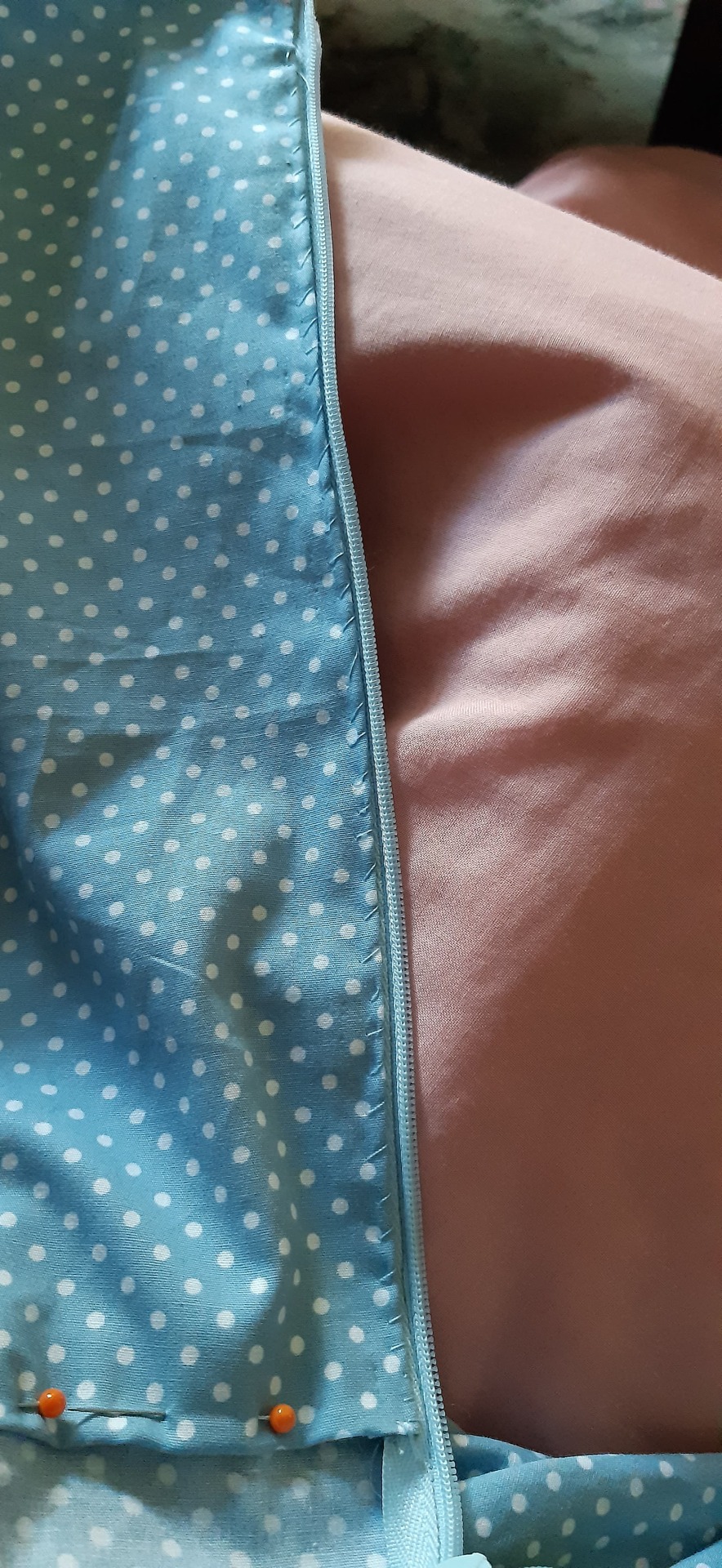
So after the stress of pattern adjusting, I spent the rest of that evening doing some hand sewing! The lining had to be hand sewing down using some slip stiches (using that stitch because if done right it doesn’t show through on the right side). The lining was also pressed up at the bottom prior to being sewn to the bodice, which really helped to encase the waist seam and darts)
I also wanted to be extra clever and encase the zip tape in the lining (to look extra ✨professional✨) which was a lot of extra work but I think it really paid off! It felt really comfortable against the skin, which me being autistic is something I really have to think about.
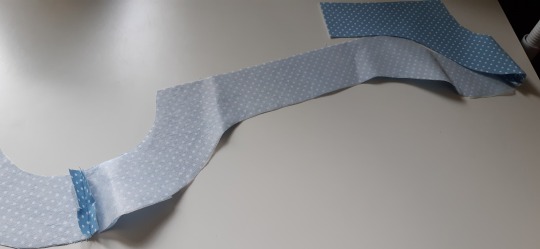

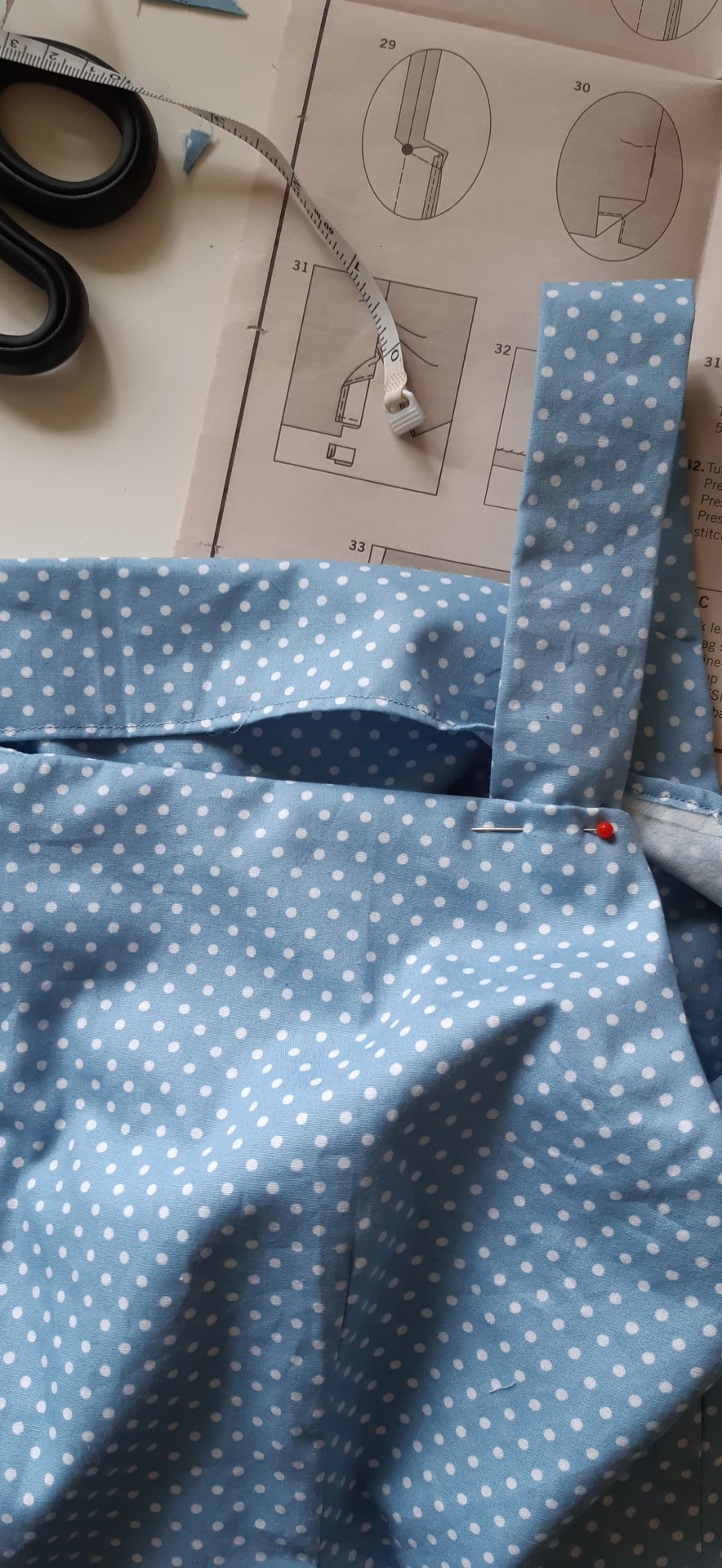
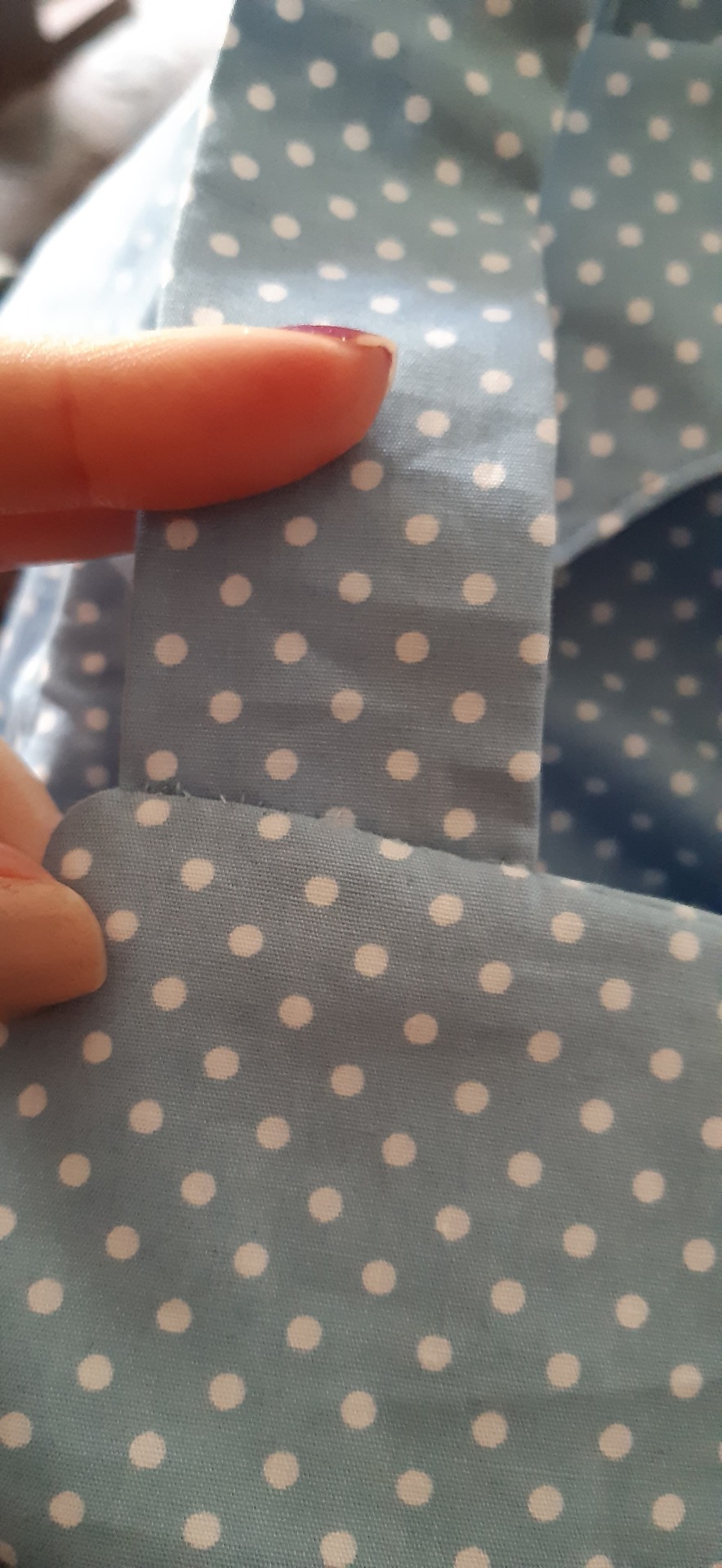
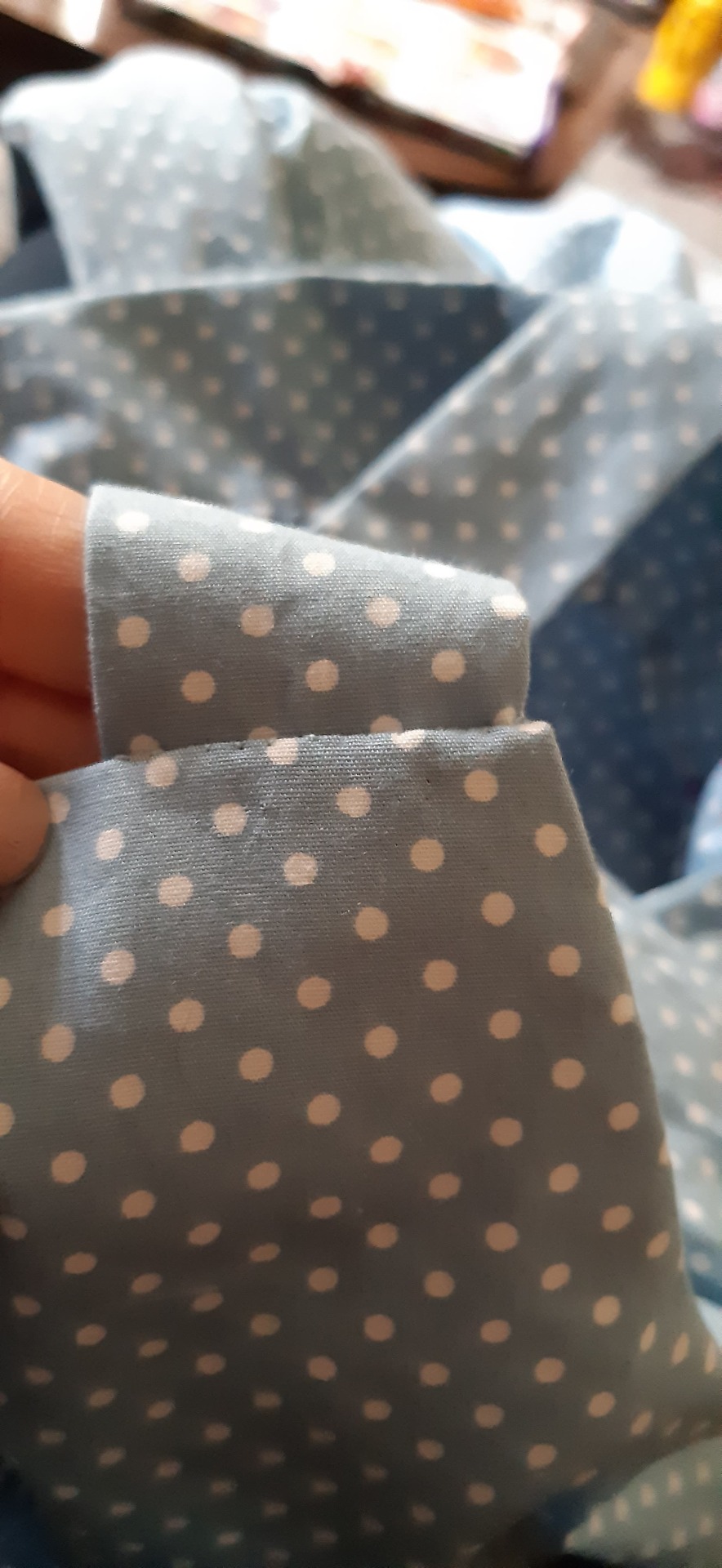

The next day was all about the facing and straps (had I read the pattern properly, the lining would have been a different fabric from the dress, which is why the facing is there to help give the illusion of it all being the same fabric, but oh well 😅)
Again it was pinned and sewn right sides together (leaving gaps at the back for the straps), flipped, pressed, and under stitched at the armholes.
The straps were a lot of work of trying the dress on and pinning the strap in a new place since for the dress to be a nice fit they needed to be way shorter than the pattern piece, but I didn’t trim them in case I ever need to adjust the dress un the future. Once that was done there for more handsewing of securing the straps (I was SO happy with how invisible my stitches looked) and hand sewing the facing to the lining)

And at last, the very final thing to do was hem the skirt 🥳
I still hate hemming, but I’ve found that I am slowly getting better at it (this is another thing that is made so much easier by taking your time while cutting the pattern pieces!)
With all the times I had to try the dress on, I found that I really liked the length of the dress as it was, so I opted for a really small 1cm hem (I could have gone for 5mm, but that would have been super fiddly). Instead of pressing up the hem I just constantly measured how much I was folding up the fabric as I pinned it in place. With the hem being the last thing to do it’s easy to rush it and call the garment done, but it’s super easy to mess it up so it’s worth pushing through a little more to get it looking super nice!
I didn’t actually check how much bobbin thread I had left when I went to sew the hem... and it ran out with a few centimetres to go 😭 And I did have much thread left on the spool, but I have have the foresight to buy a pack of pre-wound universal bobbins at Lidl last year (the middle aisles of Lidl and Aldi my beloveds!!) so I put one in of the closest colour I could find, since it would be on the inside, and the dress was finished!!!
Overall I was so happy and despite the stress of the sudden pattern adjustments, I had a lot of fun making it. I can really tell that my sewing skills have gone up a small notch since the last garment I made. and I’m super exited to get started on the Trip dress when I buy the rest of the fabric for it!
#sewing#cosplay#Two Days and Two Nights dresses#Malcolm Dress#New Look N6615#reveal pics to be on a separate post!
1 note
·
View note
Note
Leaf: We know that the Folk carries two names, one given name and one true name, so like, do they go through life without ever revealing their true names? What happens if they were tricked or something happens that made them tell someone their true name, like a bargain of some sort?
Have you ever heard the story of Rumpelstilzchen? It is an old story, with many variants. But at its core, the story often contains similar elements. A miller inflicted by excessive hubris who tells a lie about his daughter’s abilities, a king or prince who is inflicted by avarice and desires gold above all else, a miller’s daughter who makes the only choice left to her by those she should have been able to trust, a trusted servant, and a Faerie with dark intent.The story begins in a familiar vein, with the Miller bragging to the pub that his daughter had been blessed by heaven and that when she sat down to spin flaxen straw into linen thread, out had come threads of purest gold. The Miller’s name was Henkel, and he was known for his tall tales, especially after a pint of ale.Anyone who knew anything about making flax into linen would laugh at the absurdity of this. You didn’t take dry flax and just feed it into a spinning wheel and come out with anything, let alone gold. You had to rot away the stalk to get at the fibers beneath, and all that after growing and harvesting them. The whole of the spinning process alone could take days. The miller knew nothing of such things, for he paid little attention to the doings of his own house. He was a fool, but he had one truth. He loved his daughter more than anything and worked himself to the bone at the mill to provide for her. It was only on the Saturday evenings that he could take a break and go to the pub to tell foolish stories. He could have gone on Sundays, but being a God fearing man he took his one daughter to the nearby church for Mass, and afterward they lit a single votive candle for the girl’s long departed mother. But stories are often respun without the teller’s knowing, and there was someone else who heard the tale who knew nothing about the making of linen.
The King, whose name was Ruthard, had long been mocked for his desire for gold. The citizens muttered under their breath at each increase in taxes, and unrest grew by the day. Yet despite the gold that was collected, there was still not enough to repair bridges and roads, to build new public buildings, or to aid the needy. You see, a great deal of the money had been squandered in a terrible war the King had never wanted to be part of. He’d been obligated to send soldiers to aid another country’s battles, all because of a contract his father had signed many years before. Now he found himself besieged by his own nobles, each like a predator, searching for power, draining at the royal treasury wherever they could legally get away with it. There is much damage you can do while remaining firmly within the law.
So when the King heard the story of a girl who could spin flaxen straw into pure gold, he leapt at the chance. The Miller’s Daughter was brought before him. The moment she heard the summons from the King, the girl knew that her father’s wild stories had already done great damage, and that she would have to convince the King that not only were her father’s stories were merely fiction, but that her father was a kindly fool who deserved mercy for his tall tales. But the King didn’t even listen to her, cutting her off before she’d begun. She was a woman, he reasoned, and women did nothing but tell foolish tales and talk empty talk. He had no need of pretty speeches, he wanted the gold he thought she could spin.
So he relegated her to a single tower filled with straw, and declared that she should spin all of it to gold by the time dawn rose the next morning, or lose her head. The straw was not even flax, just ordinary straw, he had not even listened to that detail of the story, for his only concern was the gold that would save his kingdom.
And the Miller’s daughter wept. She, of course, could not even spin flax into linen in that time, let alone ordinary straw into gold.Now, at that time there was an elf in the country, who had come from Faerie to find himself a human child to steal away. He only wanted the child as a plaything, a doll to dress up and play with. There was no harm intended on the child, and he would have been horrified at such a suggestion, considering himself a benevolent person. But he heard from the castle servants as they drew water from the well, of the girl who was sentenced to be executed on the morn if she could not fulfill the King’s impossible demands. The Kitchen girls, of course, thought the girl was doomed and wondered if there was a way to help her somehow. But in all their talk they could think of nothing that wouldn’t endanger them as well.The elf, on the other hand, was delighted. He clothed himself in a disguise. For though he was beautiful beyond mortal imagining, he wanted to appear old, ugly, and friendly. Like an aged grandfather. In this shape he went to the tower door and unlocked it with magic.Thinking that dawn had come early, the Miller’s daughter leapt to her feet in horror, only to find that the King had not come. It was only an old grandfather, possibly the cook or the gardener by his threadbare clothes. She greeted him and he smiled a big nearly toothless smile and asked why she was so sad. So she told him her story, of her father’s foolishness, and the King’s demands.After the tale had been spun, the old man thought for a long time. Then he looked at the Miller’s daughter and grinned in a secretive manner. “I met an old witch once,” he said. “Said she was a White witch from the land of Eire. She showed me many of her secrets of the helping of people. Curing boils and finding lost things. One thing she taught me is the spinning of straw into gold. I can help you if you like.” Astonished, and slightly in awe, the Miller’s daughter could do nothing but nod. But the grandfatherly man was not finished. “There is one thing, you know. There must be a trade. An equal exchange. It’s part of things.”Nothing he said was, of course, a lie. But while he had certainly met that old white witch and been shown much of her work, there was little he could have learned from her. But the Miller’s daughter had no way of knowing that. So she offered him her necklace. A pretty thing of silver that her father had saved up for months to buy for her birthday last year. It was precious, but her father would be happier to see her alive. And a price paid, the grandfatherly old man set himself down on the stool before the spinning wheel and began to string the straw round the wheel, somehow letting it join up into straw like threads as he did so, and let it twist the threads as he wound the string forward onto the spindle…where it gleamed in the light of the flickering lamp. It was purest gold.All night he spun, and all night the Miller’s daughter watched in wonder. She could never quite catch the moment the straw became thread or the thread became gold, but the wheel spun on and everything seemed like a dream. When she awoke the old man was gone, and there were hundreds of bobbins of gold thread piled round her.
When the King arrived he gazed in shock at the room full of gold. During the night he had reconsidered his demands of the girl. Surely her father must have exaggerated the tales, for no one could truly achieve such a feat. After all, the Miller was not wealthy by any means. He had decided to go to the room when dawn came and pardon her for her father’s tall tales when he inevitably found only straw and no gold. But seeing the piles and piles of gold thread he could hardly believe his eyes. His thoughts filled of the veterans come back from the war who had no money and had returned to rotting fields and filled positions at their old jobs, he thought of the run down churches in need of repair, of so many things that could use the money he could hardly think of them all.
So in delight he took her to another room and had that filled with straw. He did not repeat his threat of having her beheaded, but since he’d forgotten to rescind it from the night before, the poor Miller’s daughter had no idea if she would survive the coming dawn. Again the old man appeared and offered the trade in exchange for spinning straw into gold. She offered the only thing she had left in her possession that he might value, her mother’s old wedding ring that she had kept with her every day for six years. It broke her heart to part with it, but she knew that her mother would tell her to give it up in an instant if it would keep her from a terrible fate. So once again was straw spun into shimmering gold, and once again the King found her upon a pile of gold when dawn came. He moved her to a third room filled with straw. But this time, having remembered his determination to remove his order of beheading from the girl, who was so obviously frightened, he offered his own hand in marriage in exchange for one more night of spinning straw into gold.He did not threaten anything for failure, but still the Miller’s daughter feared his wrath if no gold was forthcoming, so when the old man appeared once more she threw herself at his feet and begged for his help. She had nothing to give, but she offered him all sorts of wonders she imagined a queen might have access to. But the disguised Faerie was only after one thing.
“If I spin gold for you now,” he said. “You will owe me something in the future that I will come and name. When the price is stated, you must pay it.” And having no choice, the Miller’s daughter agreed.So the story goes much as you might imagine. The King discovers the Miller’s daughter sitting in a pile of gold thread, and he honors his word, marrying her and making her queen. He did not love her, but though he mourned the chance to seek out love for himself, he had a duty to his country. This woman could spin straw into gold, and had done so in three nights. More than enough gold to bring his country back from the edge of ruin. His promise had not been made lightly, but after considering what he was duty bound to do as King.
A year passed, and the Queen was with child, which was her duty. For Kings and Queens must produce and heir for the sake of the kingdom. Her father had long since learned to take care of his stories. Not one drop of ale had touched his lips for a year and a day, and he lived in the castle as an advisor to his new royal son-in-law.Every day she was attended by her maid, a girl named Elise, who she grew very fond of. They talked of many things, of fathers and mothers, of marriage, of secrets, and stories. By the time the child was born they had long since become the closest of friends.
Then the day came when the old man appeared at the door of her chambers, and the Queen knew him and let him in, thanking him for his help in saving her life from the foolish deeds of others. She had no fear of him, for he had been kind to her, listened to her, and helped her. He was not frightening really, just old and ugly. Or so it appeared. One person in the room could see his true face. Elise, the maid, was a changeling child. Long ago she had learned the trick of seeing through the haze of glamour, and instead of the old man who the Queen had told her tales of, she saw an elf standing tall and beautiful, with a wicked smile on his lips.
When the Queen asked what price the old man would ask of her now that she was free and safe from the threat of beheading, the old man swept into a bow. “I would ask for your first born child to keep for my own.”There was a long horrified silence. Through the Queen’s mind leapt a thousand thoughts of her precious baby, and the King’s despair at the loss of his newly born daughter, who despite all he loved as much as he had grown to love his wife. “Please reconsider,” she said to the old man. He tilted his head to the side, looking at her strangely. Though he had always felt kind and friendly, she now felt like a predator was in the room, waiting for the moment to strike at its prey. She felt fear.“Why?” asked the man.And she told him why. How a young girl had been caught up in the consequences of other people’s decisions. A father who told tall tales at a pub as he drank away sorrows for his long dead wife. A king with a failing kingdom who was willing to believe a fairy tale. A girl desperate to save her own life who was left no other choices to make, even had she wanted to. When at last she fell silent…the old man sighed.“You are right. There are many reasons why you are not to blame, even for your own choices. I will offer you one more deal. Knowing that your child will never come to harm even if you fail, that you are making your own choice without fear for your own life. I will grant you three days to guess at my name. Three days. If you cannot guess it in that time, you must give up your firstborn child to me once and for all.”The Queen agreed. At once she set the entire palace to work, seeking every name that could be found. The records were perused by old scholars, tax collectors gave her the names of those they collected from. Even the King helped by going up and down the lists, making sure that no name was listed more than once. For he’d long heard the story of the old man and his dear wife’s promise in the face of certain death. Though he’d been disappointed that it wasn’t truly she who had spun the gold, he did not love her less for it now.When the old man came he sat before the Queen as she went through list after list, giving every name she could think of, going on for hours as the old man calmly shook his head to every single one. When he left…the whole castle set out again to collect more names. Names from other countries, princes, kings, and peasants. Even names usually reserved for girls and women were added to the list. They could take no chances. But on the second day, as the Queen read off each name, the Old man still did not react to any of them.At last the Queen appealed to her dearest friend, Elise. Asking if she would go out and search for something, anything, that would help them. So Elise went, out into the trees near the Rhine river. There she crossed into Faerie. There she called in favors and sought out secrets till at last she came to a handsome elf sitting by a campfire and singing a merry little song to himself in the quiet of the night.“Every deed has consequence,And every deed has its price,I’ve been so kind and I’ve been so nice.Down to the palace when daylight dawns,In a manner kind and a face so fake,and then the Queen’s first child I’ll take!No one alive in hill or dell could ever guess,none on the downs have heard my fame,For Rumpelstilzchen is my name!”And at that, Elise gasped, for she had heard the secret name of the Faerie, and all he was and had done was revealed to her. The Elf man immediately quieted upon saying his name aloud and looked to see if any had heard, but he did not see the maid slipping away in silence, for being a Changling she too was Fae.The dawn came, and with it the elf in the guise of an old man. The Queen sat before him and read her lists aloud, her voice beginning to fail after three days. Though Elise had told her the secret name of the woods, she could not afford to leave out any found name before giving it. Just in case this was not the same creature. But to each name the man shook his head no and grew more and more amused. At last the Queen looked at the final name upon her list and read it aloud. “Rumpelstilzchen!”
And with that name said aloud the wicked elf’s glamour was rent in two and he stood in fury, beautiful and wonderful as the dawn, his hair glistening in the rosy sunlight like spun gold, his eyes like deep pools of water, and his body graceful like no dancer could ever even dream of. He could not touch her, he knew he could not. Because he had made a bargain and he must keep it, because with his name she held power over him and was safe from his magic, because he himself had revealed it by accident in the woods the night before. He turned round the room and looked at all within, his gaze falling upon the maid. In an instant he saw her for what she was, a Changling child. In a rage he stamped his foot against the floor and caused the whole kingdom to shake in its foundations. “THE TRAITOR TOLD YOU THAT! THE TRAITOR TOLD YOU THAT!” he screamed.But the Queen was not moved. She had seen tantrums all her life by children from the village. For all this being’s awesome powers and beauty, for all his cunning and his tricks, for all that he was and could do…he was revealed to her eyes. So she waited. Waited until at last he calmed down and stood before her in fury. Then she smiled.“You have lost and I have won. My child is my own to keep. However, I now know your name. I cannot make you do anything I wish, but I have enough power over you to know you and to be safe from you. I will offer you one more deal.”Gritting his sharp teeth in anger, but not being able to help his own curiosity, Rumpelstilzchen nodded for her to continue.“I will offer you my own name so that we may stand forever as equals, neither able to do harm to the other. In exchange you will vow on all the uncountable courts of Faerie, on the nine crowns of Faerie, on Faerie itself…that you will never again prey upon the innocent, that you will never act to bring harm to my kingdom for as long as it stands, and that you will never harm and actively protect all of my line from now until the end of time.”And elf fell to his knees. This promise would haunt him forever. It would never be broken or all of Faerie would instantly turn upon him and he would suffer a fate worse than any other. A fate worse than death. But the Queen was not finished.From a hidden place in her gown she drew a dagger of cold iron, simple in its design, but effective in its purpose. “If you refuse to agree, I will mark you with a wound so terrible that even when covered in Glamour it will let itself be known somehow in some way.”So the elf, having no choice as long ago the Miller’s daughter had no choice, agreed to the deal. Vowing upon the uncountable courts of Faerie, upon the nine crowns of Faerie, upon Faerie itself, that he would abide by her terms. And before he left, presumably to cause mischief in some other far away place, she told him her name. Edyln.
#story#fae#faerie#sidhe#otherfolk#rumpelstiltskin#rumpelstilzchen#fairy tale#retelling#elf#glamour#name#secret name#changeling#bargains#deals#tricks#promise#straw into gold#spinning wheel#gold
52 notes
·
View notes
Text
In The Young Century
By Dana Jerman
MY GRANDFATHER WAS IN A MOTORCYCLE GANG IN THE NINETEEN-TEENS. He lived in L’el Shoal, Nevada with a man named Felix who customized motorcycles that he built exclusively by himself in a garage that he also built. He allowed my grandfather to live with him above the garage because my grandfather, albeit poor, was savvy with machines, and very attractive. The young and unmarried Mexican women of the town would follow him home like lost kittens in the rain—helpless at his raw charm. My grandfather had in his charisma a bold streak, which gave him a power and magnetism often working in his favor. It was this lucky part, unfortunately, that precipitated the joining of a gang.
Once there was a man who came thru L’el Shoal in the early summer of 1919 bringing with him three young women of breathless beauty – his daughters. He had been taking them all, five originally, with him across the west in an effort to marry them off to men of trade and culture. In place of the first two daughters, his caravan contained a refrigerator and a gramophone. I do not know all of this story’s lurid details, however my grandfather, being impetuous and observant, went to the man with Felix’s prize motorcycle, offering it for all three of the remaining daughters. The man was reluctant, but my grandfather triumphed. He had spoken with the women the evening previous—sneaking into their camp only an hour after learning of their presence. The women saw his heart and asked him for help. They felt their sisters were married off to ancient, unkempt men who would only neglect them. In order to reunite with their sisters the remaining three vowed to stay together and were attempting to hatch a plan when my grandfather arrived.
Felix was dually upset, as you can imagine, on hearing that his most favored possession had been traded. Then he met the daughters, who were of the understanding that it was in fact Felix’s generosity which had saved them. My grandfather smiled the rich, knowing smile of the stealthy hero when he recalls the moment that the sisters retreated to the bedroom with Felix in a gesture of much gratitude. The kind of smile I believe he wore that night when he sat in a wooden chair in the long driveway before the garage. The end of his short cigar a dusty red star against a black sky dancing with specks of white fire, as he came to tell me the story of how he met my grandmother.
She had put her fist through glass to get out of a burning building when she was young. Her right hand had long soft indents of scars running past her knuckles and up onto her wrist. My grandfather told her that upon seeing her scabs and scars he knew that she had a place in heaven because it looked as if an angel had already tried to grab her by the hand and take her where it wanted. But it wasn’t an angel, it was a ferocious fire. A fire she started, and not accidentally…
Late in her thirteenth year she began work in a factory in the town of Campus near the county line. She made coats and worked both as a seamstress at a sewing table and a large spooling machine. The coats were big and designed for very cold temperatures. The kind Campus, Nevada, would never see. Almost a hundred workers occupied the cramped and dingy two-story building. Her uncle, her last living relative with whom she lived, also worked in the factory, there on the second floor, assembling zippers from thick silver teeth that came in big metallic canisters and glittered like shards of moon rock. Of course my grandmother, much like my grandfather, had a flash-in-the-pan quality about her that gave of sex and temper. Rebellion and direst justice. Qualities that she did not share with the authorities in the factory.
My grandfather smiled the rich, knowing smile of the stealthy hero when he recalls the moment that the sisters retreated to the bedroom with Felix in a gesture of much gratitude.
On her sixteenth birthday, and just as she and her fellow workers were getting back to their stations after a celebratory lunch, one of the suits came onto the floor to tell them that they were again to take a cut in pay. This time almost a quarter of the rate, which had been reduced by nearly ten cents a month previous. The workers froze, aghast at the news. A middle aged woman broke the silence, crying. Her cries soon escalated to wails as she sank to the floor. “I have to feed my children. My children will die! How will I feed them? My babies!!” Two women rushed to her side but she seemed inconsolable. My grandmother, standing a few feet away felt her hands reach up to grasp the sewing machine and the table to which it was crudely attached. In one motion she dumped it with an undeniable crash to the floor. The crying woman looked up. Pairs of eyes shot surprise at my grandmother, and through the sea of gazes one of the floor managers darted toward her.
She sped in the other direction, toppling other sewing tables after her. By this time three floor managers were giving chase, but she was small enough to dart under the low-lying metal casing of the large industrial spooler. There was a lot of noise and shouting by this time, but my grandmother knew just what came next. She reached for her cigarette matches in her apron pocket and began to light the massive bobbins. Moving down the row, crawling fast and watching from the floor as the flames climbed the yarn and smoke began to billow at the ceiling. The workers went fast for the exits when she was pulled from under the spooler and tied to a sewing table chair by a floor manager. She tried to fight him, but the smoke was beginning to make her eyes itch and water. The fire had spread almost instantly. Flames snatched furiously over everything as the windows were being thrown open so all could make an escape. My grandmother toppled the chair and got low to the ground. She felt for a match as she knew some had tumbled from her pocket while she was being tied. She found a way to strike it and burn quickly through the yarn, the same she had used day after day to make the thick winter coats. She coughed hard on her hands and knees, unable to look up. Her eyes and lungs crowded by smoke.
My grandmother was always keen of her surroundings and knew that the quickest way to extract herself would be through the hole in the floor. An open chute where the finished coats went into oversized laundry bins. She only hoped that there would be enough coats to catch her, and there were, though the basket was nearly on fire. In the dusty factory the blaze spread as if it had been set in a dry forest and now the first floor was charring rapidly. It was then that she shattered the window and freed herself. Bleeding from deep gashes to her knees and arms, her eyes burned and felt as if they were swelling. When she could get up a moment later she limped to the front of the building and began to call for her uncle. One of the workers ran to her. In a coughing daze grandmother did not recognize her. “Mila…Mila! Your uncle brought out a young boy just a moment ago, but he raced back for you! No one could find you! Mila… Mila! Do you understand!?”
Mila turned back to face the building only to watch the second floor collapse into the first. Knowing her uncle had been trapped she screamed, and had to be held back from the entrance. A floor manager appeared, patchy black from the smoke, and struck my grandmother, attempting to apprehend her. Two men moved in on the floor manager and in a flash everyone was crowded around the fighters.
Grandmother escaped and ran from the factory and the workers to the apartment she and her uncle shared. He had the only key, and she had to break yet another window. She felt her hand begin to ache once she was inside. She moved to lie on the soft worn thatch rug of the center room floor. Catching her breath, coughing, she felt over the back of her hand and picked out a long razor of glass. After discarding still more glass from her arm, she crawled to a basin to rinse off the blood. Sixteen years old and she looked to herself in the smudged punched tin mirror as if she’d just turned sixty. Falling asleep in the bath she awoke with a jolt hours later, suddenly consumed with the dream that she was being drowned by a floor manager. A few tiny shards of glass hovering and glimmering at the top of the pink water.
Before the light of the next morning she collected most of her things and all the money she could find in the apartment and began to walk out of town. A long walk on roads that wound out through dried up river valleys and were not traveled by many. L’el Shoal was still thirty-eight miles away when she was picked up by a man in a brand new gray car. Somehow they got around to talking and he admitted he owned a factory and should she come work for him. He’d make a comfortable life for her, he said, and when she protested with remarks made deliberate and simmering with pride, he decided to put his cigar out in a gash on her knee. Like a tiger sprung from a trap she responded by swinging her heavy bag into his face, caving his nose in. The car lurched and she tumbled out into the loose gravel, the tiny rocks pushing into the bandages on her ankles and hands. Her brand new burn wound round, quarter sized, wet and trickling.
Grandmother sixteen years old, and my grandfather was twenty-one. This age gap didn’t make much difference. Not when he helped her up out of a ditch near town early the next morning, her body stiff but yielding. Small enough to fit between him and the motorcycle. Her pack on his back. His jacket reversed and over her shoulders to shield her from the wind. She had always liked to sleep. But working at the factory kept her from six in the morning to seven in the evening. Grandpa said she slept for two days straight. “Got up to piss and drink some water once shortly after that. Then I knew she’d be okay.” he recalls. The light in his eyes appears to brighten: “Next night I came home late and she is waiting up. She asks me where she is and what day it is, and if she can have some coffee or a cigarette. I say yes to the coffee, then tell her I only smoke cigars. She says “Not while I’m around.”
He takes it to mean she doesn’t like the smell, but we know it’s something different. She does not leave the garage for a week, though she knows she can and is not afraid. One night my grandfather helps her clean and re-bandage her wounds and she admires his way and the closeness of him surges through her. She moves to kiss him and he accepts her. She offers her kisses like she was made out of love and nothing else. For my grandfather, memories of what it was like to be kissed by other women drop away like the last stars at daybreak. In the days that followed, he taught her how to ride a motorcycle.
#garage#motorcycle#romantic#sabotage#rescue#heroic#rebellion#early 20th c.#origin story#old tale#long days#men and women#grandmother#grandfather#cigar#factory fire#just and kind
2 notes
·
View notes